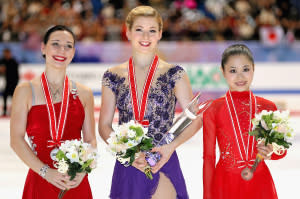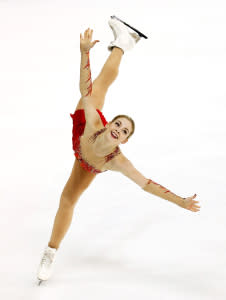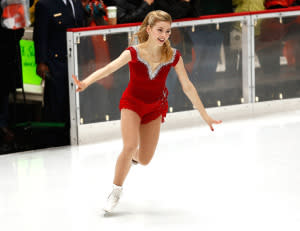PEOPLE Explains: What to Know About Olympic Figure Skater Gracie Gold as She Seeks 'Professional Help'
U.S. figure skating champion and Olympic medalist Gracie Gold announced on Friday that she would take time off — five months before the start of the 2018 Winter Olympics in South Korea — “to seek some professional help.”
The 22-year-old, who twice won the U.S. women’s skating championship, rocketed to national attention during the 2014 Winter Games in Sochi, Russia, where she earned a bronze medal on the U.S. figure skating team.
“My passion for skating and training remains strong. However, after recent struggles on and off the ice, I realize I need to seek some professional help and will be taking some time off while preparing for my Grand Prix assignments,” Gold said in a statement obtained by PEOPLE. (A rep declined further comment.)
It was not immediately clear how long Gold’s planned absence is or what her “recent struggles” may be.
There are three spots open on the U.S. figure skating team for the women’s event at the 2018 Winter Games. Those competitors will be chosen only a few weeks before the Games get underway, after the 2018 U.S. Figure Skating Championships end in January: A committee will select the athletes based on their performances from the 2017 World Figure Skating Championships through the U.S. championships.
Meanwhile, here’s everything you need about Gold and her career:
1. She Started Skating at a Young Age
Gold was born Grace Elizabeth “Gracie” Gold in Newton, Massachusetts, and later lived in Illinois, Missouri and Texas. As she explained to PEOPLE in 2014, her love of skating traces back to an auspicious encounter during a friend’s birthday.
“I started skating when I just turned 8 years old and my best friend had his party at the local ice rink, and after opening presents and eating cake, we all hopped onto the ice for a public session,” she said at the time. “We were skating around, and there were ice skaters in the middle and they were jumping and they were spinning and they were having so much fun — and I was skating around the rink and I was amazed.”
Once the party ended, Gold said, “I asked my mom to sign me up for learn-to-skate lessons and I’ve been skating ever since.”

2. Her Twin Skated Competitively, Too
Gold’s twin sister, Carly, was also a competitive skater. “She’s really good and she has a lot of triple jumps, too, so it’s so much fun to skate with her and train with her,” Gold told PEOPLE in 2014.
Carly “didn’t start skating until she saw me perform at a Christmas show,” Gold said. “She was like, ‘I want to do that sport,’ and the rest is history.”
Though Gold is technically the older of the two (by 40 minutes), she said at the time that Carly — who retired from skating last year to focus on photography — are sisters first and competitors second:
“My sister and I are competitive, but it’s a healthy competition, I mean it’s just supportive and it’s just encouraging. We’ve never had any big fights or anything. We’re best friends and close sisters.”

3. She Calms Her Nerves by Juggling
While 2014 was the year that put Gold in the international spotlight, thanks to her Olympic performance she’d already been competing at the top of the sport for several years — and all before she turned 20.
She first qualified for the U.S. figure skating championships in 2010 and earned her first gold there in 2014, earning another in 2016 (with a silver in between).
“I’ve always wanted to be the best, but especially to be the best at something different,” Gold has said. “I like the novelty.”
She has a lighter side, too, including calming her nerves before competitions by juggling.
After the U.S. skating team took bronze in Sochi, Gold was eyed as possible individual medal contender. She told The New York Times then, ahead of the single’s competition, “Now that I actually have a medal, it definitely makes me hungry for another one. And it makes me hungry for a different color one.”
She ultimately placed fourth, saying afterward, “I pretty much knew that I was going to come in fourth, but then I said, ‘I’m fourth at the Olympic Games.’ What are you talking about? Why is that disappointing?”

4. Her Career Has Hit a Rough Patch — But She Plans to Bounce Back
Gold will no longer compete in the Japan Open in October as scheduled, while the Grand Prix assignments she referenced in her statement on Friday are both slated for November.
Her decision comes after she’s already begun promoting the 2018 Winter Olympics and as her performance on the ice has deteriorated sharply in recent months, USA Today reports.
The outlet notes that Gold finished a disappointing sixth at the 2017 national championships in January, only a year after winning her second U.S. title.
“When she was skating well, she was magical,” former coach Frank Carroll told USA Today earlier this week, adding, “You ask yourself what happened to that. I hope she can find happiness.”

5. She’s Expressed Concern About Her Weight
Last October, according to USA Today, Gold discussed the body weight pressures she’s faced — as other Olympic skaters have been public about their own challenges.
“You just don’t see overweight figure skaters for a reason,” Gold said in October, USA Today reports. “It’s just something I’ve struggled with this whole year and in previous seasons. It’s just difficult when you’re trying to do the difficult triple jumps. It’s something that I am addressing, but it’s obviously not where it should be for this caliber of competition.”
Previously asked about returning for the Winter Games in 2018, Gold struck an optimistic tone, saying in 2014, “I definitely have two Olympics in me; I don’t know about three Olympics.”
She has also spoken candidly before about her skating career’s ups and downs and her drive to succeed, which she echoed in Friday’s statement: “This time will help me become a stronger person, which I believe will be reflected in my skating performances as well.”